Serving 406 students in grades 9-12, NOVA Academy Early College High School ranks in the top 50% of all schools in California for overall test scores (math proficiency is bottom 50%, and reading proficiency is top 20%).
The percentage of students achieving proficiency in math was 25-29% (which was lower than the California state average of 39%). The percentage of students achieving proficiency in reading/language arts was 70-74% (which was higher than the California state average of 50%).
The student:teacher ratio of 24:1 was higher than the California state level of 21:1.
Minority enrollment was 97% of the student body (majority Hispanic), which was higher than the California state average of 80% (majority Hispanic).
School Overview
Grades Offered
Grades 9-12
Total Students
406 students
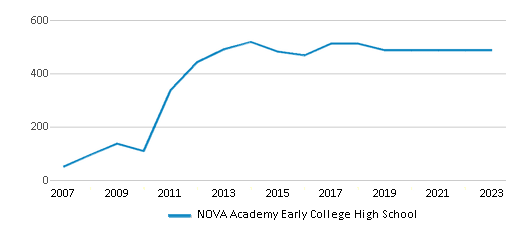
Gender %
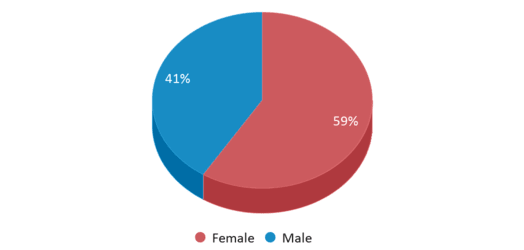
Total Classroom Teachers
17 teachers
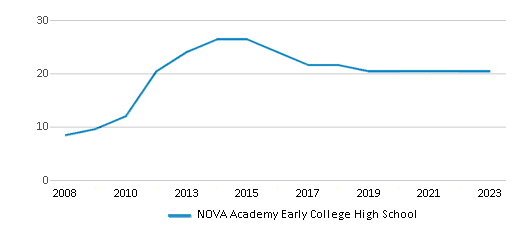
Students by Grade
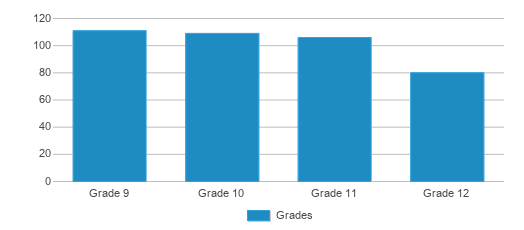
School Calendar
School Rankings
Math Test Scores (% Proficient)
(17-18)25-29%
39%
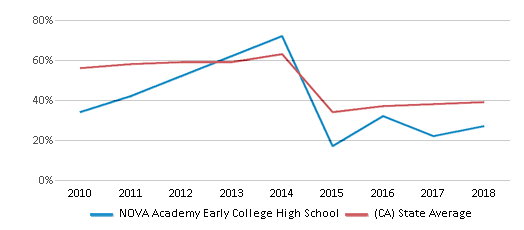
Reading/Language Arts Test Scores (% Proficient)
(17-18)70-74%
50%
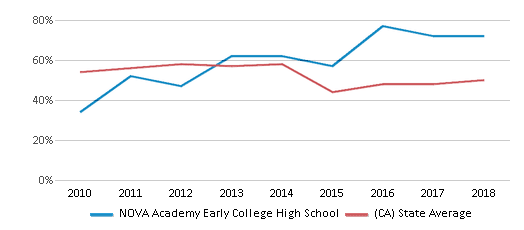
Student : Teacher Ratio
24:1
21:1
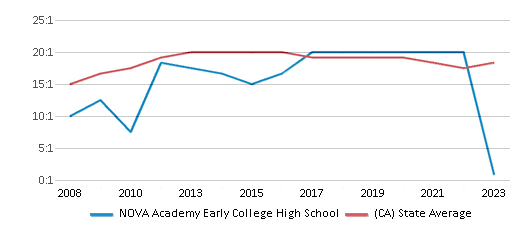
American Indian
1%
1%
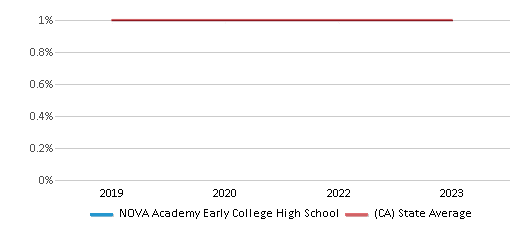
Asian
1%
12%
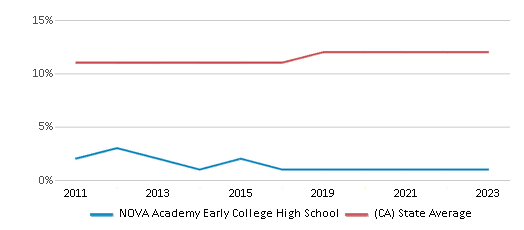
Hispanic
94%
56%
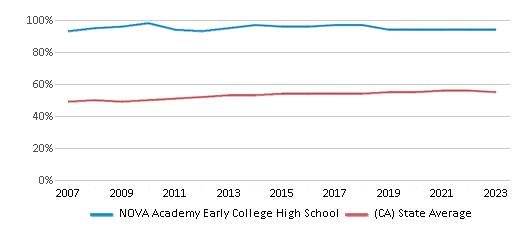
Black
1%
5%
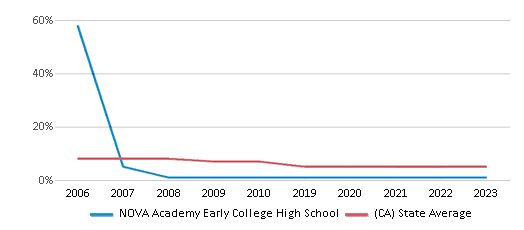
White
3%
20%
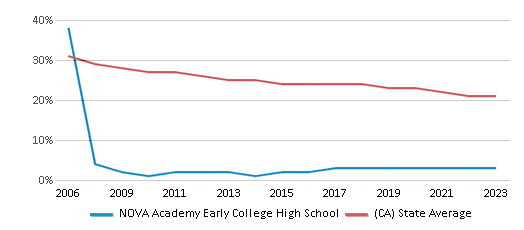
Hawaiian
n/a
n/a
Two or more races
n/a
6%
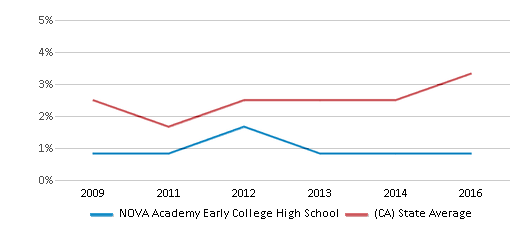
All Ethnic Groups
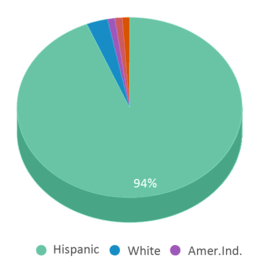
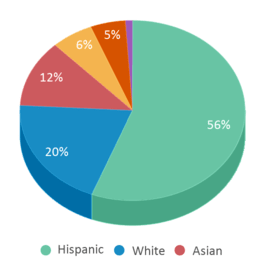
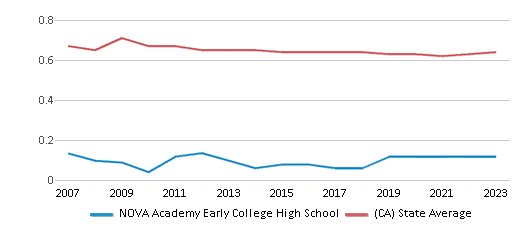
Graduation Rate
(17-18)≥95%
84%
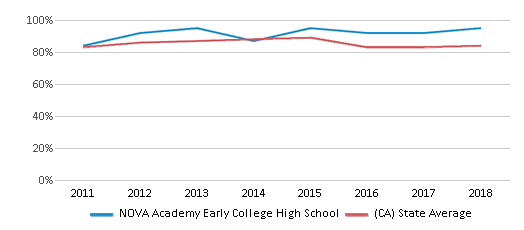
Eligible for Free Lunch
80%
54%
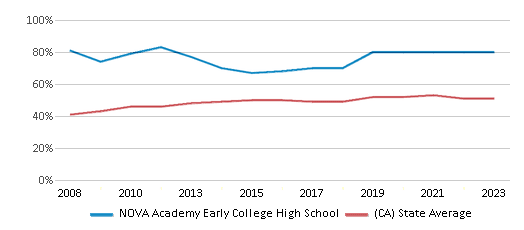
Eligible for Reduced Lunch
8%
8%
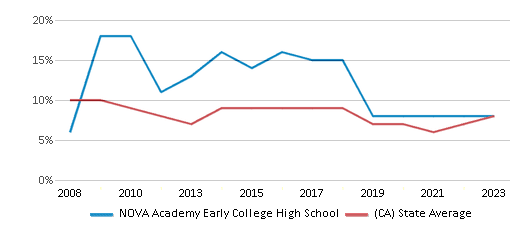
School Statewide Testing
School District Name
Sports
Total Sports Offered
3 sports
Sports
Basketball, Dance, Soccer
Source: National Center for Education Statistics (NCES), CA Dept. of Education
School Notes
- Since 2005, NOVA Academy Early College High School has provided a rigorous yet nurturing learning environment, giving students the unique opportunity to earn college credits while completing high school. A tuition-free charter school accredited by the Western Association of Schools and Colleges (WASC), NOVA Academy instills a culture of college readiness while sustaining a 99% graduation rate.
Frequently Asked Questions
What percent of students have achieved state testing proficiency in math and reading?
25-29% of students have achieved math proficiency (compared to the 39% CA state average), while 70-74% of students have achieved reading proficiency (compared to the 50% CA state average).
What is the graduation rate of NOVA Academy Early College High School?
The graduation rate of NOVA Academy Early College High School is 95%, which is higher than the California state average of 84%.
How many students attend NOVA Academy Early College High School?
406 students attend NOVA Academy Early College High School.
What is the racial composition of the student body?
94% of NOVA Academy Early College High School students are Hispanic, 3% of students are White, 1% of students are American Indian, 1% of students are Asian, and 1% of students are Black.
What is the student:teacher ratio of NOVA Academy Early College High School?
NOVA Academy Early College High School has a student ration of 24:1, which is higher than the California state average of 21:1.
What grades does NOVA Academy Early College High School offer ?
NOVA Academy Early College High School offers enrollment in grades 9-12
What school district is NOVA Academy Early College High School part of?
NOVA Academy Early College High School is part of Santa Ana Unified School District.
Recent Articles

Sexual Harassment at Age 6: The Tale of a First Grade Suspension
A six-year old in Aurora, Colorado, was suspended after singing an LMFAO song to a little girl in his class and reportedly “shaking his booty.” We look at the case and the sexual harassment problem in public schools today.

How Scaffolding Could Change the Way Your Child Learns
This article explores the concept of instructional scaffolding, a teaching method that enhances learning by breaking down complex tasks into manageable parts. It highlights how scaffolding supports students in developing critical thinking skills and becoming more independent learners. The article discusses the benefits of scaffolding, including improved engagement and reduced anxiety, and provides strategies for its implementation across various educational levels.

February 05, 2025
Understanding the U.S. Department of Education: Structure, Impact, and EvolutionWe explore how the Department of Education shapes American education, from its cabinet-level leadership to its impact on millions of students, written for general audiences seeking clarity on this vital institution.





